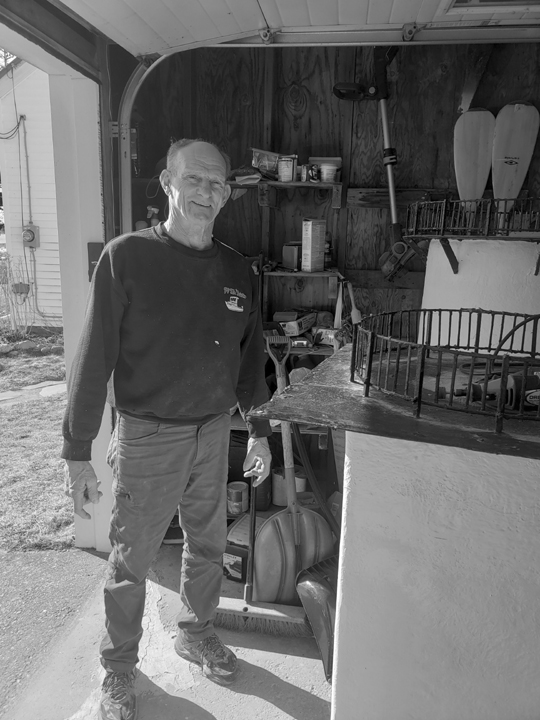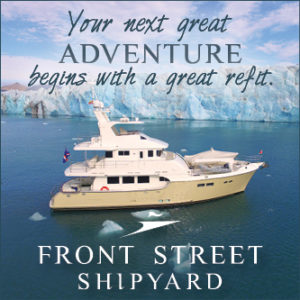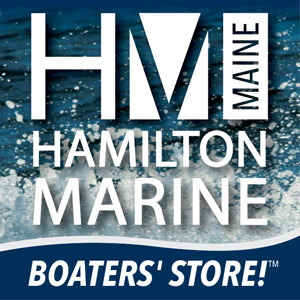
DEER ISLE – This coast has plenty of interesting individuals, many of which stay well under the radar. If you are in the right place at the right time, you may meet one of them. I happened to visit Peter Buxton when day when his wife’s uncle, Herb Carter was visiting. The stories were flowing and I quickly realized that Herb would make one very interesting interview.
Herb was born in Stonington in 1946, but two years later his father traded his farm in Stonington for one in Deer Isle. The owner of the Deer Isle farm was looking to down-size so he swapped a 4-acre farm for a 55-acre farm. They each left everything at their original property, including the animals, took their personal belongs, and moved into their new place.
Herb said, “I was a farm boy. I learned how to milk a cow and help sheep, pigs, and calves when they were born, go get eggs… you would do what had to be done. My dad was energetic. He was a carpenter, a farmer, road commissioner, worked for the town, done whatever he wanted. I do just what I want. Tell me they want me to do it and I don’t want to, sorry, not happening.”
So how did a farmer migrate to working on the water? Herb’s father was always employed but was always looking for something better. Herb added, “In 1956 we went sea mossing. We were looking for different stuff to harvest and we were doing lobstering and clamming and everything. He heard the Marine Collage moved in Rockland in 1954 and heard they bought sea moss from all over the world. We would go to Orono on Friday night to the University of Maine and get marine chemistry and biology and come back Saturday afternoon. I stayed in the gym on a mat. Fine by me, it was warm. He got mixed up with the chemist, who was Marine Collage’s chemist, who was a teacher in Orono in the winter. In 1958 he convinced the Stonington Co-op to give him a piece of property to put a building up and a dock where they could harvest and buy sea moss. He then told Marine Collage if they’d build a plant, he’d run it for ten years and he did. We started out at two cents a pound buying sea moss and in 1968 we was getting three cents. He stopped running it when his ten years was up and the co-op just shut it down. Too bad because sea moss is in everything. It is the number one gelatin in the world.”
Herb is thinking of restarting this endeavour, explaining, “When we started there was quite a lot of it, but the water was cleaner so everything grew here in the 50s and 60s. There was no species that swam in the water in New England we didn’t have here.”
Herb continued, “My old man was driving me nuts so all I want to do is get away, so I did. I went to Gloucester ground fishing in the winter. Everybody thinks lobstering is the world. It is not. It is an expensive job and you are in jeopardy every day. Somebody can go whack off a 100 of your traps, at $110-120 apiece. Clamming is the love of my life, it’s my health trip, it keeps me healthy. My dad showed me how to hand pick clams at 8. He reached his hand in the hole and hauled out a clam. That’s pretty amazing and I stuck my hand in there. I felt this thing on my hand and hauled it back out. I thought it was going to bite me and he said, ‘no they won’t bite. Just shove your hand in there and go around it and pull it out.’ It was a clam and the neck was as big as my thumb. That intrigued me, wow, that is pretty slick.”
Herb also would go over to Crotch Island and lug tools for the quarry workers on Saturdays. He said, “They give you about 60 cents for the whole day. You were making big bucks. I worked in four or five different quarries, worked in Concord, New Hampshire, Rockport, Massachusetts and Vinalhaven. They were going to teach you whatever you needed to know to do. I lugged them up tools and watched them. When I first started, there was some hand drilling, but most had jack hammers for cutting stone.”
You do not meet many fishermen that dislike lobster, but Herb certainly does. He added, “Lobstering is sickening, it is a disease. There is a chosen few of them that can do anything, but most can’t change the oil in their vehicle. The old timers had to do everything. They had animals to take care of for the food, they had to garden because you couldn’t make money enough to buy everything. You had to do everything. I hate lobstering I really do.”
At 16 years old Herb went to Gloucester and got on board dragger KINGFISHER, which was built in Essex in 1947. “She is in the state pier right now in Gloucester, buried right there,” explained Herb. “She sunk right there at the dock. I went on her. We was after groundfish but what they’d got into was red fish and we loaded that boat. One guy tells me, ‘Herbie run out there [over the net filled with fish] and get that rope,’ ‘you mean leave the boat?’ ‘You won’t sink,’ I run out there got the rope and he said, ‘you’re fast, that one over there, you have to go get that one too.’ I’d bringing the rope back to them and they’d dump them in the deck.”
For more than 18 years Herb fished on the draggers out Gloucester or New Bedford, mostly for scallops during the winters. He added, “I came in, be in overnight, wash my clothes and get my cigarettes, and somebody say, ‘Gee, we had a hell of a trip yesterday, Herb come on.’ I went on probably 25 different boats, but it was just overnight. I was a winch operator so they liked that. It was a tough job. I mean you can be out there in a hurricane and fishing 16-foot dredges. You haul it up and one goes right over the other side of the boat. It wasn’t fun. I went through five hurricanes in 1978-79.”
In 1978 after enduring one of the hurricanes, Herb came in to find out his younger brother had lost his life in a motorcycle accident after being hit by a station wagon.
The fishermen were having an issue with the union in New Bedford, so many of them moved to Gloucester. Herb said, “We didn’t want to play with the union no more. We went up there, broke that union and then they went out of business. The only things bad about it, if you got hurt on a boat, you just go to the hospital, there were no questions asked and it was all taken care of, you never got a bill. That went away.
“There were so many boats and some of them were scows,” continued Herb. “You go out for two days and come in broke down and so you jump on another one and go again.
In the summers Herb would come home and go clamming, but also anything else that might pay well. For five or six years he went lobstering with Alvin Jones on his MISS DIANE. Alvin also fished out of WILD WOOD and DANNY J. “In my book, there was no finer lobsterman on this island than Alvin Jones, said Herb. “We used to have to sell to two places so they didn’t know how many we had. We would sell to Caldwell’s half our lobsters and then go over to Clyde Conary’s and sell the rest, because we got all the bait over Clyde’s. Most were only getting 250 pounds and he would triple them. He used to shift traps all the time. He’d wake up in the night, ‘Oh I heard them last night.’ Oh, Jesus no, here we go again. I wanted to hit myself in the head just going lobstering in the morning. I hated myself. He said, ‘You don’t even know where you are until 10:00,’ ‘What the hell, did I want to know for? Why do you think I got drunk last night so I wouldn’t know where I was this morning. You are my drinking problem.’ We had fun; we had a good time. I don’t know why I done it, I lost money doing it. I would make more money clamming than I could lobstering, digging 8, 10, 12 bushels a tide.”
Clyde Conary lived in Sunset and Herb got to know him after their house burned and he moved in with his grandmother when he was eight years old. He was there a couple of years until his father finished the new house. There are stories of running rum and Herb added, “Drinking was heavy in the shop, you come in from hauling, there was no problem finding a cocktail in there. If you could sell him lobsters, you could drink. My old man didn’t drink so he never went to see them so that was good. I joined the Odd Fellows before he died and he was a big member. They used to go on all these trips and he always had a big Fleetwood Cadillac. He trucked all his own lobsters to Boston for years and years. Clyde had the CHIPPEWA as a bait boat. He thinks he also bought lobsters over at Swan’s Island. He made a good living all his life. His bookkeeper took it over, Ronnie Carter, who had been his bookkeeper for years. Then Hughie Reynolds bought it off him and he has had it ever since.”
Alfred Caldwell was Herb’s baseball coach in Little League. “I knew the whole family Tommy, Alfred, Albert, all of the sisters, Clare and Clarice,” continued Herb. “Tommy ended up taking over Caldwells and running that after his dad died. He sold out.”
Herb would still go lobstering once in a while, but he needed to be talked into it. He said he went with Donnie Eaton now and then and he was the most Downeast person you could ever meet. He also remembered some of the old fishermen, like Howdy Freeman, Harold Greenlaw, Royal Robbins, Alison Robbins, adding, “I knew all of the fishermen. Everybody knew everybody. It wasn’t the summer people there are now. I don’t know them, but they know me. I don’t know how I built up my reputation to what I did but, I did. I thought I was being out of sight. Wrong.”
Everything has changed and not for the better. “In 1976, my Dad and I fought the Department of Marine Resources for two years,” explained Herb. They were opening up mussel dragging and my Dad knew that was wrong. It is illegal as hell because my commercial shellfish license says in an intertidal zone there is zero hydraulics. That is a foot mean low water. In 1976, in the State of Maine there was 121 sardine factories and there were groundfish boats coming into Stonington every day. Instead of being satisfied with what they got, cut back the amount and get more money for them, they’d bring more in, thinking they were going to make more money. That is the wrong way to think. Fishermen are greedy, they will go for the last one today. They never needed to go mussel dragging. These guys are going out with a 40-foot boat, four men, and getting 200 boxes. I was going in a 16-foot boat doing 100 bags, alone. Mussels are the number one filter feeder in the ocean because we had millions of bushels. Today, we don’t have mackerel, smelts, frost fish, or herring. We have a few alewives, a few porgies. We don’t have fish. There is not a boat that goes out of Stonington coming in with 150 pounds of fish. What happened? The thing about a mussel bed is mussels have been living on a bed for hundreds and hundreds of years and underneath of them is acid and soot and death. Death weighs nothing and when you put it up in a water table it doesn’t sink, it stays in the water for days. Fish can’t swim in it because it blocks their gills.”
Herb spent a few years building mussel beds off Deer Isle. Then someone learned that he was going to hand harvest them and they went to the Department of Marine Resources and stopped anyone from hand harvesting mussels, did not want competition. Herb did not renew his lease, but hopefully someone understands the value of these mussel beds as a filtration system for the water table, but I am betting greed will win out.
What about some interesting stories from Herb?
“Pete Collins had the lobster smack QUICKSTEP. It was a sardine carrier and he bought it to haul lobsters in. When Caldwell burned, Tommy sold it to Pete. He was doing sea cucumbers there and his wife was buying lobsters. He couldn’t drive a wheelbarrow and somehow, he went ashore on the Brown Cow in the fall more than 20 years ago. Andrew Gove and Melvin Hutchinson went out and got him. It was rough. To get him off her, Melvin went in there with an outboard boat to get them and they almost sunk doing it. They had to make a couple trips to get one and fish him out of water and go get the other one. It was quite a rescue to get him out of there. The lobsters ended up all over hell, on the shores, crates broke out of her, she was just destroyed. They got some of the lobsters back, some of the crates. I took him over two crates. I mean, he had lost everything.”
“The hurricanes were scary, said Herb. “125 to 150 mph winds are always scary. The last big boat I was on in a hurricane was the only thing I would want to be on in a hurricane. Steel doors, steel windows, nothing was going to break. You could lock the doors down and they didn’t leak. We had that boat right underwater. One of the trips, there was a bunch of us from here, we was down off New York fishing and Oscar Johnson was the captain, I was the first mate and this hurricane started coming and I said, ‘Geez, Oscar,’ it was winter, I said ‘Oscar, let’s take the boat into the canal and stick it in the ice and let it freeze in, we won’t be beating ourselves up.’ ‘Nope, we are going to the winter fishing grounds’ and he took me off to Georges. It was flat calm. My shift took over at 6 o’clock in the morning. I had this graph that I had drawn out on the bulkhead so I can see what I was doing and get my numbers all lined up. I took one drag and went into this hole on the side of Georges it was 19 or 20 fathom. I’d seen it hundreds of times but never gone in there. Nobody would ever go in there and I said, ‘I have got to try this.’ I went in and made this one turn and hauled that thing up and there was about 45 bushels in that drag. We hadn’t seen that many scallops in ten tows, let alone one. I said, ‘Okay boys we are on. Remember the hurricane is coming, put them in the hold what you can’t shell we will have them.’ We had 110 ton of ice in the back two pens just for ballast so she wouldn’t fly around. They said, ‘Oh no, we are going to get them.’ I made my six-hour watch and the last of it, it we were getting up to 60 mph wind. I went and had dinner and got in the bunk. Then I felt the boat go whoosh and down she went and the next thing I felt was the boat roll down and when she came back there was not a scallop on that boat. We came in on a broker. If they had them in the fish hold, we could have… We laid side-to for six days and we drifted 86 miles sideways. It was terrible.”
Herb added, “I come in from cutting and the cook is throwing potatoes overboard. ‘Are you alright, fella? They should put you down in the fish hold and ice you in for a while and make you better. It was because the potatoes weren’t perfect. They weren’t round. ‘What are you going to do? We’re going into a hurricane and no food. There is 14 people and you have to feed them. Fourteen men they eat good.
“Fishing with different crews was interesting,” continued Herb. “You never knew what they was doing before they went fishing. We have had boxers, painters and architects and they would come down on the boat and they were all gung-ho to go. Then you get out around the corner and you turn around and he was about as green as green could be and it wasn’t good for ten to twelve days straight. I used to make sure there was plenty of popsicles. I would go down and grab a box of popsicles and come up and give them a nice cold popsicle. They didn’t want to eat it. ‘Just eat it, don’t even ask.’ ‘There is a reason,’ and that would cool their body temperature, get their equilibrium back, and they were good for two or three hours, and you do it again. I just couldn’t stand working with somebody throwing up beside me.”
Several years ago Herb was asked if he could build a lighthouse, he said, “I’d got over to Jay Clough’s shop in the morning and play cards with him, and he says, ‘I want one past life lasting.’ ‘What the hell are you talking about, past life lasting?’ ‘I want to put it on my cemetery.’ ‘How big do want it?’ ‘I want it about 8 feet tall.’ I made it for him. It took me a long time, about 230-240 hours. It was quite a contest for me just making it up, getting it all right. He wanted it all out of fiberglass, no wood. I found a 55-gallon drum and cut it down the seam and then I could taper it. It is the spark plug lighthouse in the North Haven Thoroughfare. I am doing another one of these for my son. I have one out there that is 11½ feet tall and that is Portland Light. My daughter wanted one of Mark Island Light. I said, ‘That is the most boring light, it’s a square box with a house on it. ‘I want that one, because I looked right at Mark Island for 38 years.”
“Wintertime,” said Herb, “I am not so enthused anymore. I used too. It never bothered me but now I would rather be walking down a beach with no sneakers. If my feet get cold then I am in the wrong place, I got to go somewhere else. When I was a kid, we used to get 115-120 inches of snow and ice. We would go clamming when I was 14 or 15 years old in the winter. I would go down and find a big ledge and climb down underneath the ice and dig in and nice and warm down in there, no wind, no nothing. Nothing like that anymore. Global warming is definitely here, no doubt. The quicker we go back to clean cold weather the better off we’ll be.”



